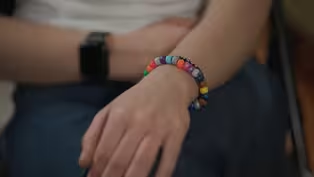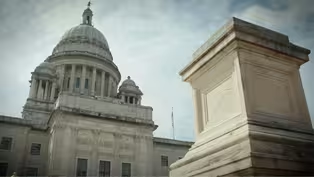
Community Sharing
Clip: Season 5 Episode 47 | 8m 55sVideo has Closed Captions
George Ortiz talks about his mission to feed the hungry through community sharing.
Nearly one in three households cannot afford adequate food according to the Rhode Island Life Index. But there is one local program that’s addressing hunger in a most unusual way. Former business executive-turned pastor, George Ortiz, founded The Elisha Project, a program that works in reverse. Instead of people going to a food pantry, pounds of free, fresh groceries are delivered to the community
Problems playing video? | Closed Captioning Feedback
Problems playing video? | Closed Captioning Feedback
Rhode Island PBS Weekly is a local public television program presented by Ocean State Media

Community Sharing
Clip: Season 5 Episode 47 | 8m 55sVideo has Closed Captions
Nearly one in three households cannot afford adequate food according to the Rhode Island Life Index. But there is one local program that’s addressing hunger in a most unusual way. Former business executive-turned pastor, George Ortiz, founded The Elisha Project, a program that works in reverse. Instead of people going to a food pantry, pounds of free, fresh groceries are delivered to the community
Problems playing video? | Closed Captioning Feedback
How to Watch Rhode Island PBS Weekly
Rhode Island PBS Weekly is available to stream on pbs.org and the free PBS App, available on iPhone, Apple TV, Android TV, Android smartphones, Amazon Fire TV, Amazon Fire Tablet, Roku, Samsung Smart TV, and Vizio.
Providing Support for PBS.org
Learn Moreabout PBS online sponsorship- I really wanted to build a nonprofit that worked and acted differently.
How do you create one of these and help people, but also at the same time, can we not offer something that helps us be self-sustainable?
Can we offer some kind of service, some kind of help?
And that was how I thought the Elisha Project would be.
Gracias.
- [Pamela] George Ortiz is the driving force behind the Elisha Project, a community assistance program.
On this day in South Providence, cars came in droves to receive fresh produce, meat, and healthcare products.
- [George] That's 25 pounds of vegetables.
We have five pounds of fresh chicken.
(George speaks in Spanish) - [Pamela] This drive-through distribution is what Ortiz has branded a share market.
Instead of those in need going to a food bank or church pantry, the Elisha Project goes out into the community.
Families can receive all sorts of essential items, no questions asked.
Ortiz says his own difficult childhood was the genesis of the Elisha Project.
- Yes, we did have a rough childhood in the sense that it wasn't your traditional mom and dad.
And a lot of things happened during those years, including one of my youngest of siblings passed away, which really had an effect on us.
- What happened?
- My seven-year-old brother passed away due to malnutrition that was going on in the house.
It was neglect and lack of community and all those things that contribute to that kind of outcome.
(George speaks in Spanish) - Reversing that outcome for others is what Ortiz believes he was born to do.
But the road to this was a long one.
His mother was charged with manslaughter in his brother's death and sent to prison.
His father had died years before.
Do you think that that informed what direction your life would take later?
- At the time, my only quest was, "How do I make sure that this never happens again via money?"
If I could just be successful in life and start a family of my own and never find myself in that situation where I was in want or need, then that would never happen to me again.
Ironically, it did happen to me.
- [Pamela] At first, Ortiz came to live with his grandmother in Rhode Island.
He later joined the Marines, serving in Operation Desert Storm.
Afterwards, Ortiz began his own marketing business, but that success didn't last.
And he says failure was swift and painful.
- It went under in such a dramatic way that we lost everything little by little.
So if you can imagine, you take a kid that grew up on food stamps and welfare, with a mother in jail.
You take that kid, you put him in the Marine Corps, the kid does well and now he's living on a golf course in Newport Beach, California.
Comes to Rhode Island and in three years he's back at square one.
Loses the house, loses the cars, loses the business.
- [Pamela] Depleted and desperate, Ortiz, his wife, and children moved into his brother-in-law's basement.
He became active in their church's soup kitchen.
(George speaking in Spanish) Eventually, Ortiz was inspired to enroll in Divinity School, becoming a minister.
Some 15 years ago, he created the Elisha Project, named for the Biblical Prophet who performed many miracles.
- Let's do what we can with what we have and let God do the miracles.
So we went to Price Rite with $48.50.
We made 24 lunches.
We went to the corner of Classical and where Crossroads meet and we started giving out meals.
- That humble beginning with bag lunches is now the logo of the Elisha Project.
In 2023, the nonprofit distributed more than six and a half million pounds of food and 2,000 pallets of furniture and household items.
How are you different?
- We're always hustling to bring in fresh protein.
And yes, of course, we need shelf stable, but they can get those at the food banks and the pantries.
What they can't get, because they lack refrigeration, is what I give.
The food banks have to work under something called Feeding America.
And because of that, they are limited to what they can take.
The food bank's like the Army, we're like the Marine Corps.
We're specialized.
We can receive a call from fishermen down in Wakefield that say, "Hey, we're a group of spear fishermen and we collect X amount and we usually have like 40 extra.
Do you know families that can take that?"
Yes.
- [Pamela] Using the same military precision, the Elijah Project acts as a distributor, creating partnerships with community and charitable groups.
Ortiz serves as a quartermaster of surplus.
He calls the roundup food rescue.
- Food rescue is whatever you think that you're gonna throw out, we show up and we get days end.
I just took it a step further and started knocking on LongHorn Steakhouse, Olive Garden, pizzerias, anything you could think of.
We had Seven Stars Bakery, we had Providence Bagel, we had Stop & Shop.
We were collecting from 26 restaurants.
- Perishables from bread to bananas, fresh produce and toiletries are all given away at monthly share markets or more frequent neighborhood popups.
This is amazing.
I mean furniture.
- That's all Christmas stuff, right?
So this is all holiday stuff, stuff that's going out.
- [Pamela] Today, the outreach program is headquartered in what looks like a warehouse, but is actually the old Apex department store in Pawtucket.
Excess new furniture donated by Costco is stored here and provided to low income families.
Volunteers are busy each day, bundling up bags and boxes of toiletries and personal care items, surplus from CVS and other stores.
Even new towels are donated by local hotels.
Volunteers work with a determined passion.
- Sometimes, you know, you have to work with your heart.
- [Pamela] Marvin Mayorga is a Spanish language radio DJ by profession, but he says his purpose is his daily donation of time to helping others.
People like the woman who asked about a box being loaded on the truck that was about to be thrown out - And somebody say, "Can I take that box?"
And I say, "Nah, that box is no good.
It's garbage."
And the lady said, "Whatever's garbage for you is food for me."
When you hear that, your heart is moving, it's broken into pieces, because sometimes, you don't know what you have when you don't have nothing.
- [Pamela] Ortiz says he's also motivated by what he witnessed growing up.
And he tries to instill in his son, who works with him, the example set by his grandmother.
- Even when we were in the housing projects, she would always say, "All we need is a little bit more water to make some more rice.
Invite your friends over to eat."
So we always had an open apartment where anybody could come through and eat.
And that kind of was instilled in me that you always have enough to share.
- [Pamela] And Ortiz says, just because you have fallen on hard times, doesn't mean you are any less human.
The share market and his work hunting down fresh food and resources is a mission he undertakes full force.
- If I want to do something, I'm either gonna die or get it done.
There's no other way for me because I've never had a plan B for anything in life.
If I said I'm going forward, forward, I'm going.
Video has Closed Captions
Clip: S5 Ep47 | 8m 58s | The U.S. surgeon general has declared loneliness to be an “epidemic.” (8m 58s)
Video has Closed Captions
Clip: S5 Ep47 | 4m 54s | Governor Dan McKee will submit his budget in January; legislators are preparing for cuts. (4m 54s)
Providing Support for PBS.org
Learn Moreabout PBS online sponsorship
- News and Public Affairs

Top journalists deliver compelling original analysis of the hour's headlines.

- News and Public Affairs

FRONTLINE is investigative journalism that questions, explains and changes our world.












Support for PBS provided by:
Rhode Island PBS Weekly is a local public television program presented by Ocean State Media

